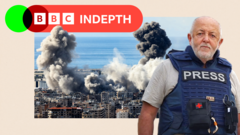Lebanon Ceasefire: A Fragile Respite in a Long-Standing Conflict
The recent ceasefire between Israel and Hezbollah brings temporary relief to Lebanon, where over 3,500 citizens have been killed and more than one million displaced by Israeli strikes. The anticipation of peace was palpable, with one Lebanese analyst comparing the wait to a child’s excitement before Christmas.
Israel’s decision to halt military operations stems from several strategic considerations. Prime Minister Benjamin Netanyahu believes the country has achieved significant military success, significantly weakening Hezbollah’s capabilities. The Israeli military has inflicted substantial damage on Hezbollah’s organization, effectively reducing its threat to Israel.
The ceasefire aims to push Hezbollah back from the northern border and allow civilians to return to border towns. With a side letter from the Americans, Israel retains the right to take military action if Hezbollah appears to be preparing an attack. Netanyahu highlighted multiple reasons for the ceasefire, including giving Israeli forces a chance to “replenish stocks” and breaking the connection between Gaza and Lebanon.
For Iran and Hezbollah, the ceasefire is equally crucial. They need time to recover from the significant strategic losses. The death of key leaders like Hassan Nasrallah and the destruction of their military infrastructure have severely compromised their deterrence strategy.
The geopolitical landscape is complex. The ceasefire is deliberately paced and fragile, with its ultimate fate potentially influenced by the upcoming return of Donald Trump to the Oval Office. Some optimists hope Trump might pursue diplomatic breakthroughs, while pessimists fear he might abandon efforts towards a two-state solution.
However, the article emphasizes that this ceasefire is merely a temporary respite, not a comprehensive solution. The fundamental political ruptures in the Middle East, particularly the long-standing conflict between Israel and Palestinians, remain unresolved.
Netanyahu and his government believe military force can ultimately dominate their enemies and alter the region’s power dynamics. This approach, however, has historically failed. Despite generations of attempts to achieve peace through military victory, both Arabs and Jews have repeatedly fallen short.
The Hamas attacks on October 7th, 2023, dramatically exposed the unsustainability of managing the conflict while denying Palestinian self-determination. The Lebanon ceasefire represents a momentary pause but does not address the deeper, systemic issues.
The article concludes with a sobering assessment: the Middle East cannot escape generations of war and violent death until its fundamental political conflicts are genuinely confronted and resolved. The Lebanon ceasefire is a temporary reprieve, not a lasting peace.




